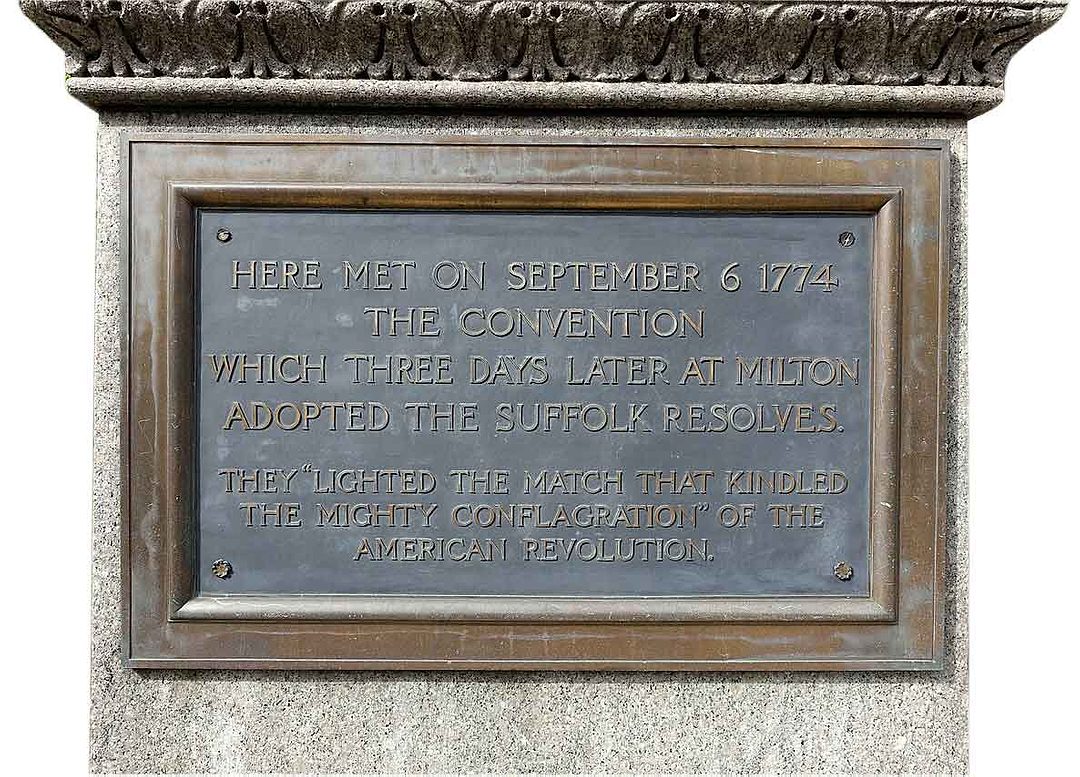When General Thomas Gage dissolved the Massachusetts Colonial Legislature on June 21, 1774, many communities throughout the colony demanded that town and regional committees be organized to counter Gage’s actions and form a constitutional government that would protect their rights and liberties. By late August, correspondence committees across the colony called for representatives from every town to organize county conventions and draft resolutions outlining the strategy and legal justification for opposing Crown policy.
On September 6, 1774, representatives from all the towns in Suffolk County gathered in Milton, Massachusetts, to declare their grievances and outline a strategy for resisting the British Coercive Acts. After three days of debate, Dr. Joseph Warren drafted the resolutions, which were adopted.
The Suffolk Resolves denounced the Coercive Acts and outlined a comprehensive plan of defiance. First, the Suffolk Resolves called for a complete cessation of trade with Great Britain to weaken British trade and exert pressure for the repeal of the Coercive Acts. Expressly, the convention declared, “That until our Rights are fully restored to us, we will to the utmost of our Power (and recommend the same to the other Counties) withhold all commercial Intercourse with Great Britain, Ireland, and the West Indies, and abstain from the Consumption of British Merchandize and Manufactures.”1
Hoping to deprive the British administration of the financial resources necessary to enforce its authority, the Suffolk Resolves also called on the colony’s population to refuse to pay taxes “until the said Government shall be placed upon a constitutional foundation.”2
The resolutions also called for the outright disregard of the Coercive Acts, the resignation of all royal officials appointed under the Massachusetts Government Act, the creation of independent colonial militias to protect the colonists from British overreach, and the formation of a “Provincial Congress” to safeguard Massachusetts colonists’ civil liberties and freedoms.
The Suffolk Resolves were not an isolated act of defiance. They built upon a growing wave of resistance across the colony. Other county resolves, such as those adopted by Middlesex, Essex, Plymouth, and Worcester Counties, had already expressed similar sentiments of defiance and called for concerted action against British oppression. While significant, these other resolves lacked the comprehensive and unified approach articulated in the Suffolk Resolves.
Once the resolutions were adopted, Massachusetts colonist Paul Revere rode to Philadelphia to deliver a copy to the First Continental Congress. The Congress, recognizing the urgency and gravity of the colonial grievances, endorsed the Suffolk Resolutions, effectively adopting them as their own. This demonstration of solidarity strengthened the Massachusetts colonists’ resolve and highlighted the growing unity of the American resistance movement across all thirteen colonies.
Notes:
1 Massachusetts Historical Society. “At a Meeting of the Delegates of every Town and District in the County of Suffolk ...,” accessed January 19, 2025, www.masshist.org/database/viewer.php?item_id=696&pid=2.
2 Ibid.


